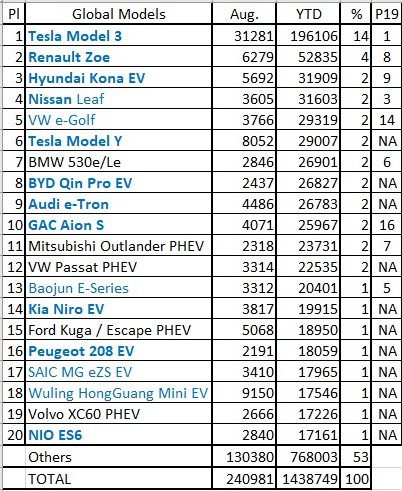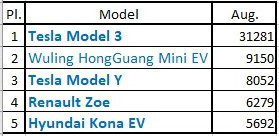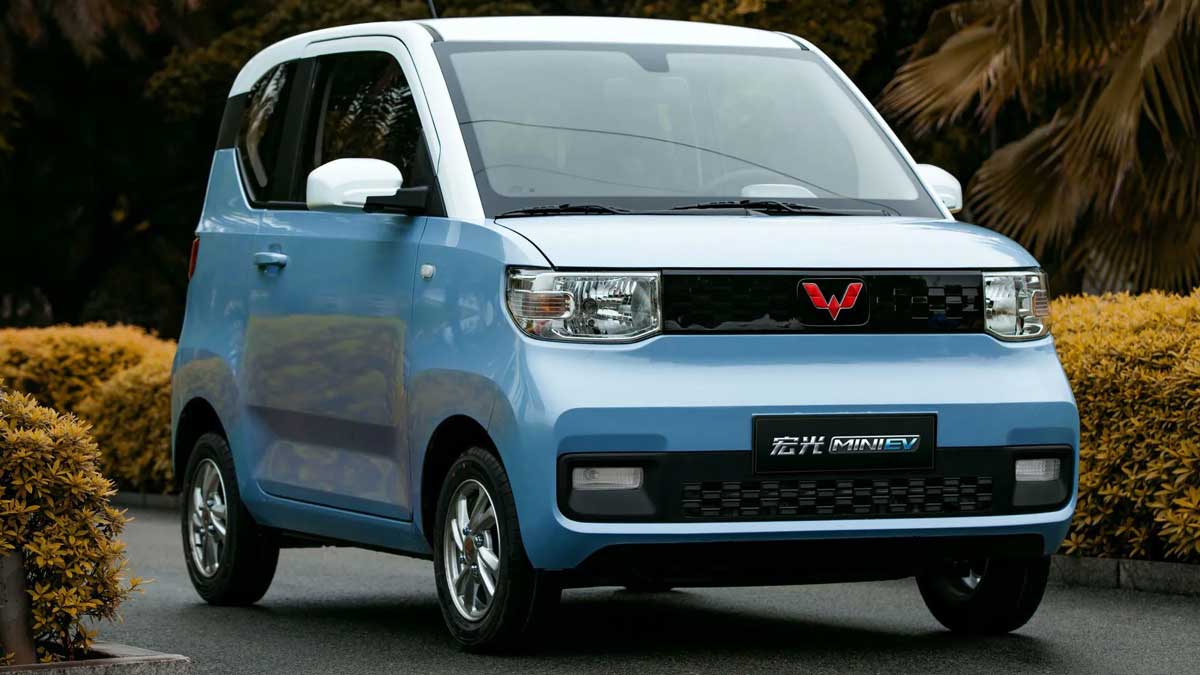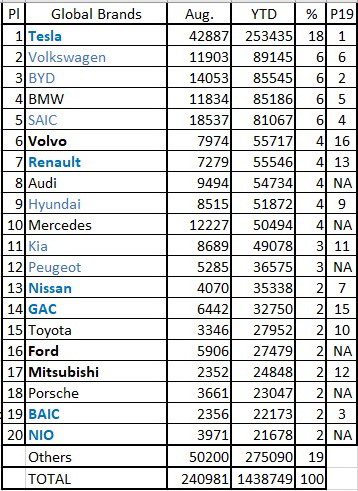Tesla has sold more Model 3 electric sedans worldwide in 2020 than the next five most popular all-electric cars combined.
From January until the end of August, Tesla delivered just shy of 200,000 Model 3s to customers worldwide, cementing again its leading role in the transition to electric mobility.
Adding the almost 30,000 Model Ys delivered up to end August, plus circa 28,000 Model S and Model X sales and Tesla has reached 253,435 sales globally, according to Jose Pontes of EV Sales. This compares to Renault’s 52,835 Zoe sales, or the 30,000 or so Hyundai Kona Electrics and Nissan Leafs sold.

The numbers compiled by José Pontes of EV Sales indicate the recovery of the EV market is continuing amid the Covid-19 pandemic, even if overall sales of new cars are still subdued in most countries.
For Tesla, which gained number one and number three spot in the August ladder for its Model 3 and Model Y, the figures are encouraging, but it will be a stretch to achieve the 500,000 EV sales “comfortably” promised by Musk at Tesla’s earnings call in January.

With an estimated capacity to produce around 170,000 vehicles in the last three months of 2020, final 2020 figures will likely fall short of that target by around 15% – perhaps forgivable considering the impact of Covid-19 and the deep fall in petrol and diesel sales.
According to Pontes, the EV market at large saw an 58% year-on-year increase in sales and plug in electric vehicle sales doubled. This compares with a 10% decline for combustion vehicles.
The Ev that has come out of nowhere to land number at number two spot in the August table is a tiny city car made in China under a SAIC-GM-Wuling joint venture called the Wuling Hongguang Mini EV.
It sells for the equivalent of around $A6,000, and the company said in August it had already taken 50,000 pre-orders according to Carscoops.

Overall and including plug-in hybrids as well as all-electric models, it is Volkswagen that trails Tesla, but still by a wide margin, with 89,145 units sold compared to Tesla’s 253,435.
China’s BYD and Germany’s BMW jostled for third and fourth position (BYD won out for August thanks to its wide portfolio – only one model made it into the top 20), and China’s SAIC also put on a good show with a little more than 80,000 vehicles sold year-to-date.

Pontes notes that in terms of volume sold, Volkswagen shows the biggest growth in EV sales so far in 2020, with an 18,583 increase in units sold (a 206% increase) compared to Tesla’s 17,745 increase and Daimler’s 11,675.
With its ID.3 now being delivered in Europe and the ID.4 not too far in the distant future, is it possible that VW will give Tesla a run for its money in 2021? Importantly, Pontes also notes that being the second month of the quarter, Tesla numbers should be taken with the caveat that a ramp up of figures for September is pending.
We will report Australian EV sales report early next week, when we compile Vfacts and Tesla shipping numbers for a three-quarter running total.

Bridie Schmidt is associate editor for The Driven, sister site of Renew Economy. She has been writing about electric vehicles since 2018, and has a keen interest in the role that zero-emissions transport has to play in sustainability. She has participated in podcasts such as Download This Show with Marc Fennell and Shirtloads of Science with Karl Kruszelnicki and is co-organiser of the Northern Rivers Electric Vehicle Forum. Bridie also owns a Tesla Model Y and has it available for hire on evee.com.au.

